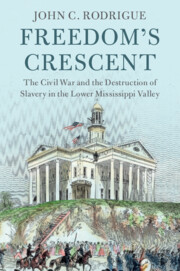Book contents
- Freedom’s Crescent
- Cambridge Studies on the American South
- Freedom’s Crescent
- Copyright page
- Dedication
- Epigraph
- Contents
- Figures
- Acknowledgments
- Abbreviations
- Additional material
- Introduction
- Prologue Life – and Labor – on the Mississippi
- Part I From War for Union to Military Emancipation, 1860–1862
- 1 “An Independent Power”
- 2 Of Stampedes and Free Papers
- 3 “Broken Eggs Cannot Be Mended”
- 4 “The Unsatisfactory Prospect Before Them”
- Part II From Military Emancipation to State Abolition, 1863
- Part III Abolition: State and Federal, 1864
- Part IV The Destruction of Slavery, 1865
- Epilogue Memphis and New Orleans: May 1–3 and July 30, 1866
- Bibliography
- Index
3 - “Broken Eggs Cannot Be Mended”
from Part I - From War for Union to Military Emancipation, 1860–1862
Published online by Cambridge University Press: 19 January 2023
- Freedom’s Crescent
- Cambridge Studies on the American South
- Freedom’s Crescent
- Copyright page
- Dedication
- Epigraph
- Contents
- Figures
- Acknowledgments
- Abbreviations
- Additional material
- Introduction
- Prologue Life – and Labor – on the Mississippi
- Part I From War for Union to Military Emancipation, 1860–1862
- 1 “An Independent Power”
- 2 Of Stampedes and Free Papers
- 3 “Broken Eggs Cannot Be Mended”
- 4 “The Unsatisfactory Prospect Before Them”
- Part II From Military Emancipation to State Abolition, 1863
- Part III Abolition: State and Federal, 1864
- Part IV The Destruction of Slavery, 1865
- Epilogue Memphis and New Orleans: May 1–3 and July 30, 1866
- Bibliography
- Index
Summary
During second half of 1862, Unionists – including slaveholders – in the occupied lower Mississippi valley organize politically, with assistance from Federal military authorities. By July, Lincoln has already decided to issue an Emancipation Proclamation, and his frustration with the failure of Unionists in Louisiana to act influences his thinking. Lincoln issues preliminary Emancipation Proclamation in September, spelling out requirements for Confederate areas not to be declared in rebellion. Federal military forces establish contraband camps for fugitive slaves, but also express fears of former slaves becoming dependent of government support; they also implement systems of wartime free labor on plantations under military oversight.
- Type
- Chapter
- Information
- Freedom's CrescentThe Civil War and the Destruction of Slavery in the Lower Mississippi Valley, pp. 82 - 99Publisher: Cambridge University PressPrint publication year: 2023

